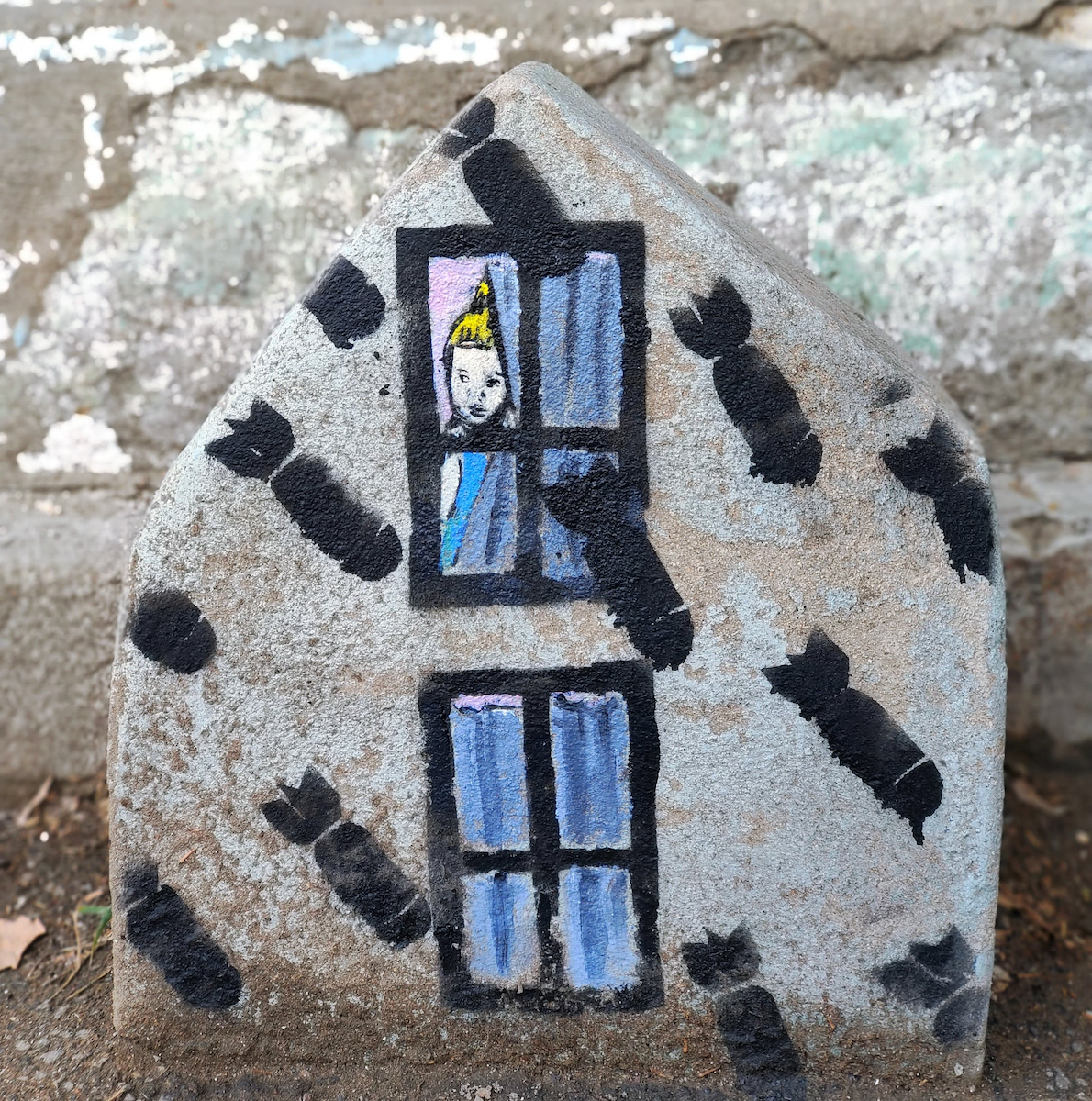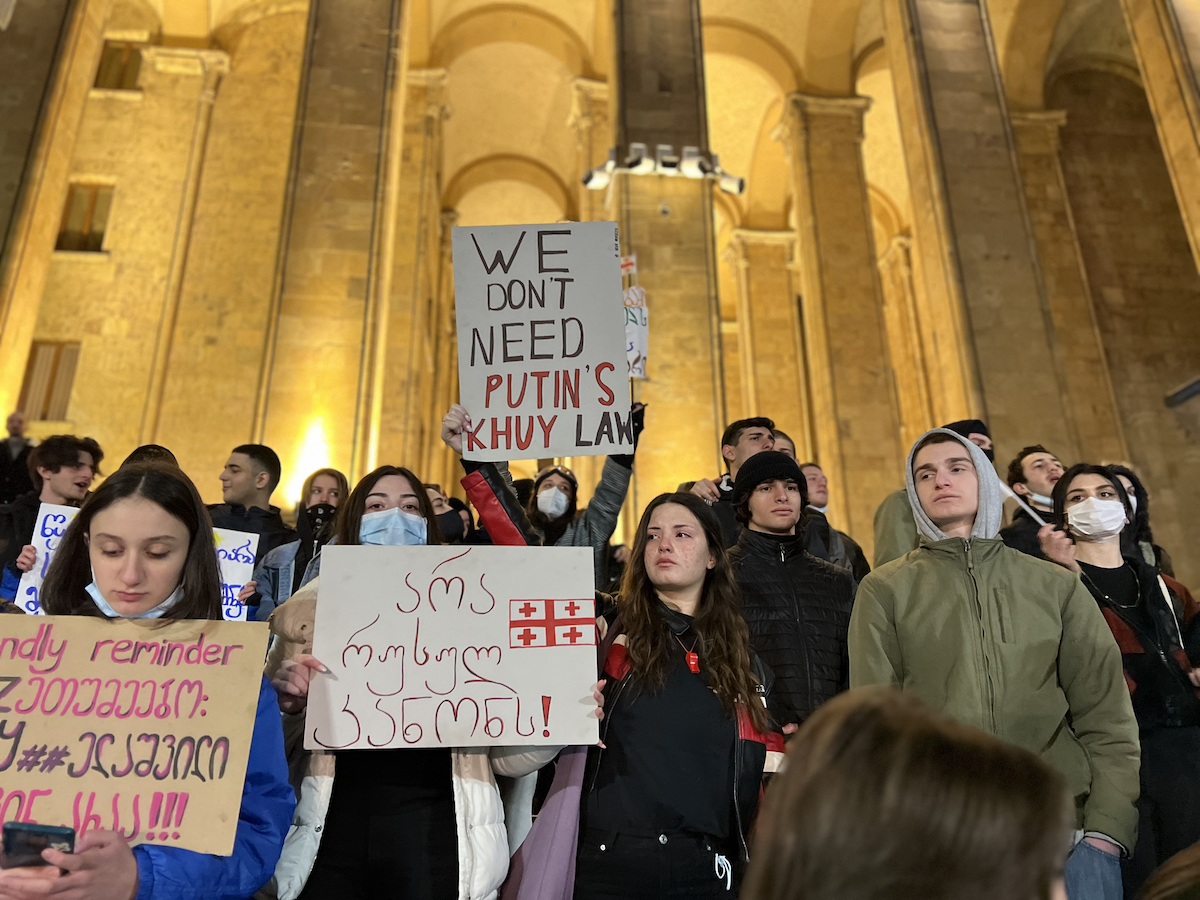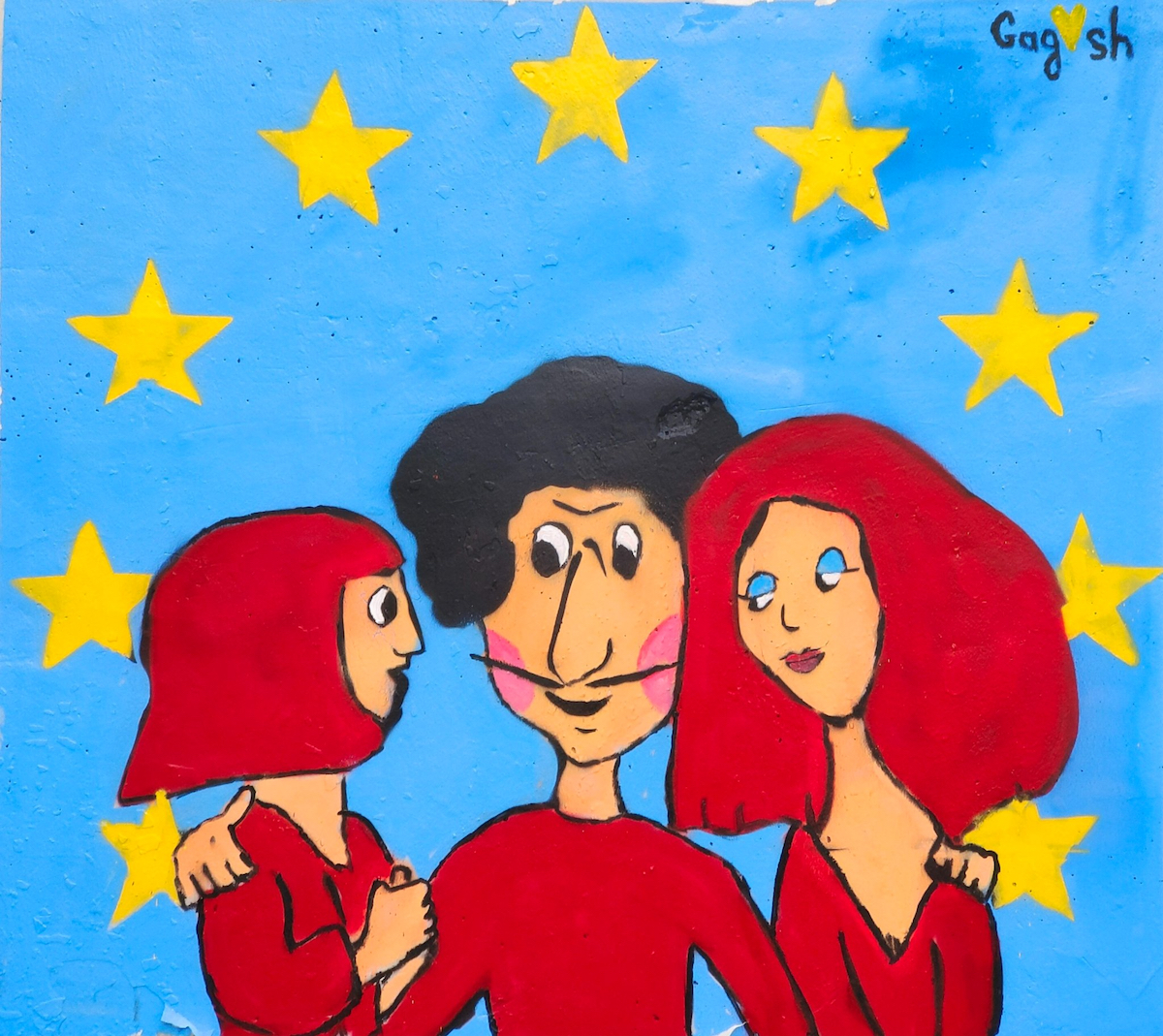By Salome Japiashvili
Summary: This personal article discusses the situation in Georgia and the role Russia plays in igniting the conflicts with its neighboring countries. The Russian government does all that is in its power to polarize the societies in the South Caucasus because it knows that the choice for these countries is between the West and Russia. The Russian tactics include propagating fake news and financing far-right movements, serving the famous “divide and conquer” approach.
I intend to draw more attention to this region now—especially in the context of the Russian invasion of Ukraine—because Georgia has been the object of Russian imperialism for centuries, without Western societies fully realizing the significance and the gravity of the situation. The overwhelming inclination of Georgia’s population towards Europe makes Russia scared to lose its influence in the region, and we are all witnessing the horrific consequences of this imperialistic approach.
These tensions are particularly evident in the recent protests that transpired in Georgia against the ruling party, which has displayed Russian sympathies. In March 2023, protesters resisted the government’s attempts to adopt what has been described as a ‘Russian law’ targeting the media and civil society. I will contextualize the current situation by sharing my personal experience of the Russian invasion of Georgia in 2008, and reflecting upon crucial approaches to countering disinformation and building peace.
Russia’s Invasion of Georgia: 2008
I remember August 3, 2008 vividly. I was celebrating my twentieth birthday with friends and family by planning a hiking trip in the mountains of Georgia. Just as we were discussing the details of where to camp and the likes, my father entered the room. I will never forget the expression on his slightly pale face as he said: “I think the war is about to start…”
The shelling had started on August 1 by the separatist forces from Samachablo (the self-proclaimed state of South Ossetia) that were backed by the Russian troops. But naïve and young as we were, we could not realize what the actual consequences would be. Soon after, my cousin and a close friend of mine, both 19-years-old, had been taken to the frontlines to protect our country.
Then came a few weeks of complete horror. I was too young to understand the big picture. But since the Russian troops had entered the very heart of Georgia—Gori—my brothers were unable to come back from vacation in Borjomi due to a blockade of the main East-West Road. I was obviously worried about my brothers being stuck in Borjomi, and my friend and my cousin protecting the country at the frontlines. But at the same time, I was scared for my own safety—as everyone would be.
I remember staying awake at night, thinking that I could somehow “prevent” Russian planes from bombing us. I was thinking that if I could spot the planes beforehand, they wouldn’t bomb us, maybe… It sounds so ridiculous now, but in the middle of the war, any thought that mitigates the horrible feeling of helplessness for a 20-year-old is a tremendous relief.
Another childish thing I did was to contact random Skype users located in Russia. My desire was to talk to them and maybe get some empathy or compassion from them. But soon, I realized that the absolute majority of them saw Georgians as the ultimate evil that simply deserved to die. Of course, I was even more devastated.
In August 2008, the Russian forces bombed various cities and villages. Gori and the capital city, Tbilisi, were repeatedly attacked, as well (1). I really thought my life would never be the same due to this trauma, and I realize now that I was not entirely wrong. In the immediate aftermath of the war, I left for Jena, Germany, to complete one semester of scholarship studies. There, I encountered an overwhelming number of Westerners telling me that Georgia had started the war, not Russia. It was extremely painful, but I kept calm and did my best to neutralize the ever-so-strong Russian propaganda.
At the time of this article’s publication, 20% of Georgia is still occupied by Russia. As the so-called “creeping occupation” continues in 2023, the Russian invasion of Ukraine has shown once again how difficult it is to deal with Russia. And how unjustified and unprovoked these aggressions are.
Russia’s Invasion of Ukraine: 2022

One week before February 24, 2022, I was visiting Germany. During that time, the number of Russian troops was drastically increasing at the Ukraine border day-by-day. However, some of my friends in Berlin still tried to “understand Putin,” and convinced themselves that this was all just a big fat bluff or that Putin had “his own reasons” for it.
I often ask myself: what have we done wrong up until now? How did it happen that we, the direct victims of Russian aggression, could not convince the rest of the world that Russian intentions have steadily remained imperialistic in the modern history of Europe?
The war of 2008 was not the only time I intended to lead fruitful conversations with Russians. In the years between 2013 and 2019, I met many educated, successful Russians that participated in European youth programs and other projects I was involved with. To my surprise, I kept being astonished and disappointed by the sheer power of Russian state propaganda.
The majority of them thought that the Soviet Union was something that truly united the nations—as opposed to the reality of the Red Army invading each country. I also received vague answers like: “I am not against anyone. That’s why I am not against Putin’s government, but I don’t support it either.” Or they said, “If Georgia or Ukraine tries to join the EU or NATO, you will have to bear the consequences.” Alternately: “I don’t believe in countries. The Soviet Union was great and I don’t want to talk about politics.”
At some point, I simply realized that the information Russians receive their whole lives is dramatically different from reality. They do not actively seek out unbiased information and sometimes it is simply close to impossible to discuss political issues with them. For a fruitful discussion to take place, the parties should at least agree on what the reliable sources of information are. When that basic condition is not met, the dialogue becomes extremely difficult.
Protesting the ‘Russian Law’ in Georgia: 2023

Since the 2022 Russian invasion of Ukraine, the trauma of 2008 again came alive for me. I felt even more helpless, realizing the global consequences of the atrocious war crimes of Russia. However, it is true that Georgia is a small country with merely 3.7 million inhabitants, making our options extremely limited. According to the recent surveys, the vast majority of Georgia’s population supports a Euro-Atlantic future (approximately 80%) (2). However, this is not enough to successfully achieve the goal of Euro-Atlantic integration, especially since the government of Georgia as of 2023 seems to be sabotaging our European perspective.
Widespread protests swept across Georgia on March 7, 2023, when our Parliament supported a law on ‘foreign agents’ that resembled a Russian law directed against the media and the civic sector. All 27 EU member countries—Georgia’s Western partners—and an overwhelming number of Georgian organizations and public figures have called upon the “Georgian Dream” ruling party to not support the bill. Despite the extensive resistance, the Parliament of Georgia started to discuss the law and the absolute majority of the ruling party voted in favor of the so-called ‘Russian law.’
After two days of extensive protests—and the government special forces trying to aggressively and unsuccessfully disperse the protesters with water cannons, tear gas, and pepper spray—the government decided to revoke the law. The videos of a Georgian woman withstanding the water cannon jet and waving the EU flag has become viral all over the world (3). The law was officially rejected by the Parliament of Georgia on March 10, 2023. However, the government keeps arguing that their intention was in the interests of the country, calling tens of thousands of protesters radicals, satanists, and a confused bunch of people who have simply misunderstood the government’s “noble” intentions.
I personally have participated in the protests actively and I keep thinking: what else can I do to support the country’s EU perspective? How can we continue to tackle the Russian propaganda that has been widely unsuccessful in Georgia, but still remains a threat to our national security and perceptions by the world?
Building Peace through Truth-telling: 2023 onward

One thing I believe that we can all do is to learn ways of promoting media literacy and spreading accurate information, including checking our sources and learning to detect Russian propaganda and other forms of disinformation. Sharing transparent and trustworthy information should stand on its own. It’s less effective to try and negate or repeatedly fact-check “fake news”; rather, one should strive to spread the truth in the first place. Once misleading information is widely circulated, it becomes all the more evident that the only “antidote” is for reliable information to be spread even earlier and to larger audiences.
What I think Georgians have learned from their previous experiences with Russia is that the information war is not something we can neglect. At the core of the Russian state government’s approach stands an intention to simply demoralize a society and make people believe that there is nothing to fight for and no one they can trust, which is simply not true. While disinformation campaigns may have contributed to creating these hostile environments, it is certainly counterproductive to think that the solution is to distrust everything and everyone.
Unfortunately, I do not believe that any major transformations can happen without changing the current dictatorship in Russia. But when this day hopefully comes, it is better for us to be prepared to talk about the issues that were impossible to discuss before. Not everyone has patience or the desire to discuss these topics with Russians who are imperialistically motivated, since the problem is certainly not only in the approach of the government, but rather entrenched in the overall mood of the country. Yet, it is certainly worth it to try and share the truth and your own story, like I have done here.
One of the most powerful tools we can use to intervene in the information war is to spread personal stories that mean something to us and others. By sharing our emotions and real experiences, the public gets to hear from a first-hand source: the storyteller. Thus, it is something people trust and take to heart more as well. Of course, sharing personal stories and truthful narratives is a long-term process. But the sooner we start to merge our realities, the more chances there will be for peace.
That is exactly why I wanted to contribute my own input to this column series: because I believe that even a single-story matters and helps build up a collective memory that is difficult to erase, even by authoritarian governments. So, my recommendation to peacebuilders experiencing conflict is to tell your stories. I especially encourage my fellow Georgians to tell everyone what you saw and went through, and what it means to live in a country that still has 20% of its land occupied by Russia. These personal experiences can connect all of us together on a human level and help dispel even the most virulent propaganda. In this way, I believe that stories have a tremendous healing power, and can help rebuild our communities on both a local and global scale.
About the Author
Salome Japiashvili is an independent interpreter and translator for Georgian, English, German, Romanian, and Russian languages. She holds an MA degree in economics and has over 30k followers on Facebook, where she shares content related to different issues, including foreign languages, civil society, and psychology. Salome has translated four novels and interpreted for more than 300 events.
References
Featured Image: Protesters in front of the Parliament of Georgia, March 9, 2023. Photo by Anna Zeragia
1. There were no casualties in Tbilisi though.
2. https://georgianjournal.ge/society/36796-survey-80-of-georgians-support-eu-membership-74-nato-accession.html
3. Interview with the woman holding the EU flag, with English subtitles translated by me: https://youtu.be/phu0ypdMDFc.

